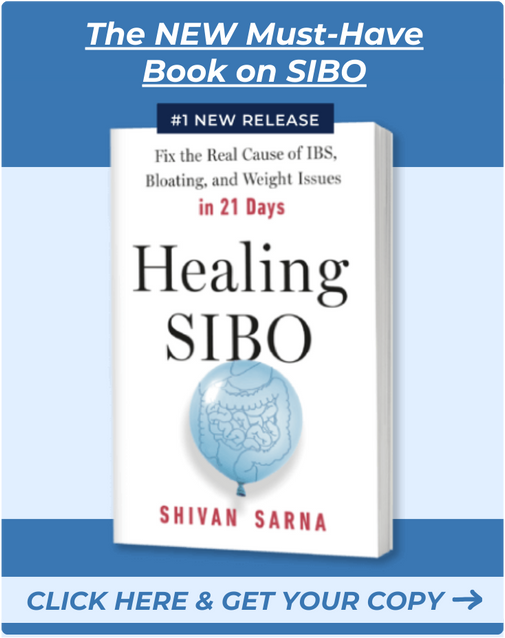Small Bacterial Intestinal Overgrowth (SIBO) occurs when “bad” bacteria populate the small intestine, causing digestive symptoms. SIBO is not hereditary and can be developed at any point in life. It’s important to be able to pinpoint your “root cause” to treat your SIBO most effectively.
While everyone has a small amount of bacteria present in our bodies, the bacteria in our digestive system are regulated by our stomach acid, the Migrating Motor Complex (MMC), bile, your small intestine’s immunes system, and the valve between the small and large intestine keeping bacteria confined. Any problems with these systems can lead to the development of SIBO.
Here are some of the most common causes of SIBO and why they occur:
Low Stomach Acid
Stomach acid is key in digesting your food properly and keeping bacteria to a minimum. When stomach acid levels are sufficient, it breaks down food particles and create an acidic environment that helps to control the proliferation of harmful bacteria that may enter the digestive system through food or other means.
Low stomach acid, also known as hypochlorhydria, can disrupt this delicate balance. It can occur for various reasons, including chronic stress, certain medications like proton pump inhibitors (PPIs) that suppress acid production, autoimmune conditions affecting the stomach lining, and aging. When stomach acid levels are compromised, the reduced acidity allows bacteria to survive further up the digestive tract than usual, increasing the risk of bacterial overgrowth in the small intestine.
Stress
During periods of stress, the body’s “fight or flight” response is activated, diverting resources away from non-essential functions like digestion. This can lead to reduced stomach acid production and diminished gut motility leading to SIBO.
These changes create an environment where food stays in the digestive tract for longer periods, providing an opportunity for bacteria to proliferate and potentially lead to SIBO. Additionally, stress can disrupt the balance of the gut microbiome, altering the composition of beneficial and harmful bacteria.
Migrating Motor Complex (MMC) Dysfunction
The MMC is a crucial contraction pattern of the digestive tract that occurs during periods of fasting, typically between meals and during sleep. Its primary function is to sweep food particles and bacteria from the small intestine into the large intestine, preventing bacterial overgrowth.
When the MMC function is compromised by SIBO, this regular “cleaning” is hindered. This sets the stage for stagnation of food and bacteria within the small intestine, allowing bacteria to thrive and multiply.
Antibiotics
While antibiotics are often thought of as crucial in fighting bacterial infections, their use can also have unintended consequences. Antibiotics target and eliminate bacteria, which includes both harmful and beneficial species throughout the body, including the gut.
When antibiotics are prescribed and used for infections like strep throat or a UTI, they can disrupt the delicate balance of the gut microbiome by wiping out not only the harmful bacteria but also the beneficial ones that regulate gut health. This disruption can create an environment that allows for bacterial overgrowth in the small intestine. Antibiotics can also impair gut motility, which slows down the movement of food through the digestive tract and makes it easier for bacteria to develop.
Food Poisoning
Food poisoning, typically caused by eating food that contains pathogenic bacteria, can significantly impact the delicate balance of the gut ecosystem. In some cases, the infection and subsequent inflammation can impair the intestinal lining, leading to slower gut motility and slowing the movement of food and bacteria through the digestive tract.
This stasis creates an environment where bacteria can linger in the small intestine, potentially leading to SIBO.
Adhesions
Adhesions, a form of scar tissue that can form within the abdominal cavity following surgeries or inflammation, can create physical obstructions or restrictions within the intestines, impeding the normal movement of food and creating little “pockets” where bacteria can accumulate. This can hurt the flow of the digestive tract, leading to prolonged exposure of the small intestine to food particles.
Adhesions can also create a gut environment that is difficult to cleanse effectively during routine digestion, further allowing the growth of bacteria.
While any of the above could be the reason that SIBO develops, it’s important to pinpoint what specifically may have caused your SIBO so you can begin to treat your root cause.
Looking for help finding your SIBO root cause and creating an action plan? Consider joining us in the SIBO Recovery Roadmap® Course, a 40+ video lesson course with patient advocate Shivan Sarna and SIBO specialist Dr. Allison Siebecker that follows the proven nine step plan to healing from SIBO.






